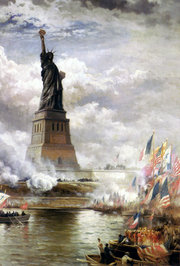Freedom
|
|
- For proper-noun uses of Freedom, see Freedom (disambiguation).
Freedom refers, in a very general sense, to the state of being free (i.e.: unrestricted, unconfined or unfettered).
| Contents |
In philosophy and history
The French philosopher Jean-Jacques Rousseau asserted that the condition of freedom was inherent to humanity, an inevitable facet of the possession of a soul and sapience, with the implication that all social interactions subsequent to birth imply a loss of freedom, voluntarily or involuntarily.
See Liberty for the main article on freedom in philosophy and history.
Freedom has often been used a rallying cry for revolutions. For instance, the bible records the story of Moses leading his people away from slavery, and into Freedom. In his famous "I Have a Dream" speech Martin Luther King Jr. quoted an old spiritual song sung by black American slaves: "Free at last! Free at last! Thank God Almighty we are free at last!"
The ama-gi, a Sumerian cuneiform word, is the earliest known written symbol representing the idea of freedom.
Usage
- Political freedom is the absence of political restraints, particularly with respect to speech, religious practice, and the press.
- Freedom of a person refers to not being in prison (including not being a victim of false imprisonment). It may also refer to the enjoyment of all of the privileges of membership of a place or club (as in the honour, the Freedom of the City).
- Economic freedom is sometimes equated with economic power. The term, as used by economists usually means the degree to which economic actors are unfettered by governmental restrictions, as in the Index of Economic Freedom. Some economists, such as those responsible for the Wall Street Journal/Heritage Foundation Index, frame the issue of economic freedom as "the degree to which the public sector interferes with the private sector," and argue that the less a government acts to interfere with the economic freedoms of businesses and individuals (such as through taxation or law), the healthier the economy will tend to be. Other schools of economic thought argue that the public sector need not always be seen as an unwanted intruder on the economy, that government action should not be seen as necessarily interfering or freedom-infringing. (See also [1] (http://cf.heritage.org/index/pastScores.cfm), Free trade)
- Software freedom or other freedom of information (or ideas); i.e.: information (esp. software) being free of practical or (more commonly) legal restrictions on its use, modification, distribution and (less often restricted) creation. See also: Free software, Open source and gratis software
- Freedom of expression (or speech) is similar to freedom of information, but refers to a general lack of such restrictions (on the creation, use, modification and dissemination of ideas) in a society by the government or those that hold power in that society.
- Freedom of education closely resembles autodidacticism, which views modern schooling as a dismal system of captivity. Students have traditionally seen gaps in the school year as freedom from their oppression. This idea is not to be confused with liberal education, as one may interpret them as opposites.
- Freedom of thought is also known as freedom of conscience and refers to the right of an individual to hold a particular thought or viewpoint regardless of those held by others.
- Being not in any relationship (be it a romantic relationship or a cooperative, for example), free to do what one wants, including starting a new relationship or having relationship tests (like one-night-stands, casual physical intimacy, etc).
- Psychological freedom, i.e. the ability to make the choice to not be afraid of failure in its most basic form.
- Leaving one's parents' home and coming of age
- Freedom of choice, i.e. free will
- The absence of interactions in physics; for example, asymptotic freedom discovered by David Gross, David Politzer, and Frank Wilczek
- For the shorter term, being free also means having holidays, weekend, finished work for the day, having a break.
- Political philosopher Gerald MacCallum designed the following concept of freedom, allowing for its 'fleshing out' into many different conceptions: "X is free/not free from Y to do/not do/become/not become Z."
Quotes about freedom
- The Eagles : "Freedom? Oh, freedom, that's just some people talking, you're in chains while you walk through this life on your own."
- Jean-Jacques Rousseau : "All men are born free, and yet everywhere lie in chains."
- "Eλευθερος γ θανατος" (Freedom or Death!)
—Cretan War cry.
See also
hi

